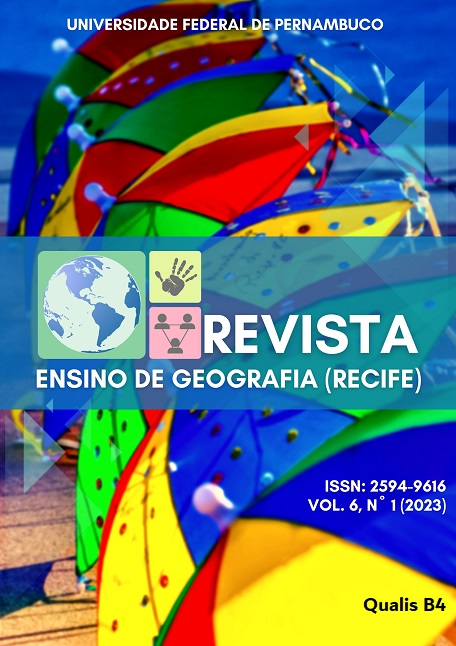Supervised internship in geography: considerations about the contents relation field-city and its consequences in the brazilian geographical space
DOI:
https://doi.org/10.51359/2594-9616.2023.257414Keywords:
countryside-city, geography teaching, green revolution, capitalismAbstract
Capitalism assumes, in Brazil, its monopoly phase from the 1940s, especially after the 1960s, when the “Green Revolution” spreads. In the face of green packages that encompassed the massive entry of heavy machinery and the use of genetically modified seeds and animals, the country becomes the scene of rapid and intense transformations both in rural and urban spaces. In the meantime, the present work is a product of the Teaching Project presented as a partial requirement to pass the Supervised Internship in Geography Teaching III subject, from the Department of Geography, Campus Prof. Alberto Carvalho, from the Federal University of Sergipe. The project was directed to students of the 7th Year of Elementary School at Estadual Prof. Nestor Carvalho Lima School, located in the city of Itabaiana-SE. The objective of this work was to analyze the rural-city relationship and its unfolding in the geographic space from the Green Revolution (1960). The method of analysis of this research was the dialectical historical materialism, with the purpose of bringing to light the contradictions engendered by the existing relations between urban and rural spaces and was based on a qualitative approach, aiming to encompass the experiences developed throughout the teaching-learning process. For that matter, the students understood the concepts discussed about the countryside-city relationship and its developments that helped in the understanding of these rearrangements materialized in the agrarian space and in the urban space, to contribute to the denuding of nature-society and the promotion of a fully emancipated societyReferences
ALENTEJANO, P. R. As relações Campo-Cidade no Brasil do século XXI. Revista de Políticas Públicas, v. 7, n. 2, 2003, p. 01-23.
CAMPOS, C. S. S. A face feminina da pobreza em meio a riqueza do agronegócio: trabalho e pobreza das mulheres em territórios do agronegócio no Brasil. Buenos Aires: CLACSO, 2011.
COGGIOLA, Osvaldo. A colonização da América e a acumulação originária do capital. Jus Humanun. Revista eletrônica de ciências jurídicas e sociais da Universidade Cruzeiro do Sul, v. 1, n.1, 2011, p. 140-174.
DESLANDES, Suely Ferreira. A construção do projeto de pesquisa. In: DESLANDES, Suely Ferreira; NETO, Otávio Cruz Neto; GOMES, Romeu; MINAYO, Maria Cecília de Souza (orgs.). Pesquisa social: teoria, método e criatividade. Petrópolis: Editora Vozes, 2002.
HESPANHOL, R. M. Campo e Cidade, Rural e Urbano no Brasil Contemporâneo. Revista de Geografia da Universidade Federal do Ceará, v. 12, n. 2, 2013, p. 103-112.
LEI GERAL DA ACUMULAÇÃO DO CAPITAL, 2021. 1 vídeo. (02:01:49 s). Publicado pelo canal TV UESB. Disponível em: https://www.youtube.com/watch?v=iuQ-YZPovJ0. Acesso em: 27 mai. 2021.
MARQUES, M. I. M. A atualidade do uso do conceito camponês. Revista Nera. Presidente Prudente, n° 12, p. 57-68, jan-jun. 2008. Disponível em: http://www2.fct.unesp.br/nera/revistas/12/9_marques_12.pdf. Acesso em: 23 jun. 2021.
MARQUES, M. I. M. O conceito de espaço rural em questão. Revista Terra Livre, ano 18, n. 19, 2002, jul./dez., p. 95-115.
OLIVEIRA, A. U. de. A mundialização da agricultura brasileira. São Paulo: Iãnde Editorial, 2016.
REIS, D. S. dos. O Rural e o urbano no Brasil. ENCONTRO NACIONAL DE ESTUDOS POPULACIONAIS, ABEP, 15. Anais... Caxambu (MG), p. 01-13, 2006.
SANTOS, M.. Por uma outra Globalização. SP: Record, 2000.
SCHNEIDER, S.; VERARDI FILHO, M. A. As atividades rurais não-agrícolas e as transformações do espaço rural: perspectivas recentes. Cuadernos de Desarrollo Rural, Bogotá (Colombia), v. 1, no 44, p. 11-44, 2000.
SIMONETTI, Mirian Claudia L. (1999). A longa caminhada: (re)construção do território camponês em Promissão. São Paulo, Departamento de Geografia da Universidade de São Paulo. (tese de doutorado)
SPOSITO, M. E. B. Capitalismo e Urbanização. São Paulo: Contexto, 2002. 80 p.
TAVARES, L. A. As fronteiras físicas do espaço rural – uma concepção normativo-demográfica. Revista RA&GA, Curitiba, no 7, p. 33-46, 2003.
THE INTERCEPT BRASIL. Café com pólvora: funcionários do império alimentício Maratá usam tiro, fogo e violência para tomar área de camponeses no Maranhão. Disponível em: https://theintercept.com/2021/05/31/funcionarios-do-imperio-alimenticio-marata-usam-tiro-fogo-e-violencia-para-tomar-area-de-camponeses-no-maranhao/. Acesso em: 31 mai. 2021.
THOMAZ JUNIOR, A. Degradação sistêmica do trabalho no agrohidronegócio. Revista Mercator. Fortaleza, v. 16, p. 1-20, 2017.
Downloads
Published
How to Cite
Issue
Section
License
Authors who publish with this journal agree to the following terms:- Authors retain copyright and grant the REVISTA ENSINO DE GEOGRAFIA (RECIFE) right of first publication with the work simultaneously licensed under a Creative Commons Attribution NonCommercial International 4.0 (CC BY-NC) that allows others to share the work with an acknowledgement of the work's authorship and initial publication in this journal.
- Authors are able to enter into separate, additional contractual arrangements for the non-exclusive distribution of the journal's published version of the work (e.g., post it to an institutional repository or publish it in a book), with an acknowledgement of its initial publication in this journal.
- Authors are permitted and encouraged to post their work online (e.g., in institutional repositories or on their website) prior to and during the submission process, as it can lead to productive exchanges, as well as earlier and greater citation of published work.



